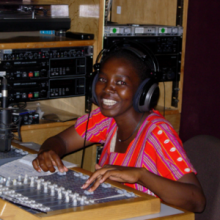The 10 traps to avoid when you want a sustainable community radio
Areas of advice to take important steps in the right direction in building a sustainable community radio
By Birgitte Jallov, www.empowerhouse.dk
Anyone working with community radio in one way or the other longs for a recipe on how to ensure long-term sustainability. Such a recipe does not exist. But there are a number of important factors that are crucial for sustainability – and a related number of traps on the way it is easy to fall into which will effectively undermine long-term sustainability.
The text below is an excerpt from ‘Empowerment Radio – Voices building a community’ e-book, that is free to download here.
- Don’t think a community radio can be a ‘quick fix’!
Change is made by people – and takes time!
A community radio can be the source of important community change and important community impact.
But getting this in place takes time.
Either by building the radio around existing community development activities or by letting the creation of the radio be the motor to begin – or strengthen – such community development.
Well, of course, you can put up a radio station, physically, in a week’s time. But having the equipment in place is NOT what does the trick, it does not generate social change!
- Don’t begin the life of a radio with a studio and equipment!
Find the players before starting to play!
To generate community engagement and ownership, it is important for the community to identify who they actually are: mapping all the communities in the community.
- Don’t hire a couple of journalists from the capital city to do the programmes!
Ownership comes from doing it yourself!
Community ownership is at the core of sustainability. The community needs to be in the studios and do the programmes themselves – or at least know those community members doing the programmes.
- Don’t think community volunteers represent a resource that cannot be exhausted.
There is no such thing as a free volunteer!
Community volunteers are the heart blood of the radio. The volunteers give their time, their enthusiasm and dreams for creating a better tomorrow, and they lend their credibility. And the volunteers receive a lot from the radio: training in how to produce good programmes, which requires planning, researching, systematizing material and presenting things effectively. It is important to register and document this in volunteer contracts, highlighting duties and rights.
- Don’t think capacity building, coaching and training ever ends!
Prepare for constant change!
It is important to plan for and maintain a continuous process of capacity building and volunteer introduction activities: volunteers by nature move on after some years – especially the many young people.
- Don’t let the community radio become owned by a small clique in the community.
A radio for all must be owned by all!
A community radio for development needs to belong to all.
- Don’t forget to maintain a high ethical profile and clear inclusive editorial line and style.
A power tool can cause harm!
Community radios – and other radios – have been the channels and thus promoters of terrible acts of violence through hate speech. And some radios promote hate speech and bring on air other kinds of destructive opinions and programmes on an ongoing basis. A radio in itself is just a channel – and as it can generate powerful social and other community development impact, it can do harm. It is important to build into the DNA of your radio, ways of regularly carrying out a check on such developments.
- Don’t push up your expenses – be wise, like you are in your home!
Modesty and cleverness can get you far!
For financial sustainability, the basics are to limit costs right from the start. Some examples:
- do not to commit to salaries that cannot be met in the medium to long run
- find ways of limiting energy costs
- pursue wise equipment and studio configuration decisions
- try to receive free mobile phone subscriptions and sets from providers against mentioning their sponsorship
- engage in wise partnerships for important expense items
- Don’t think that everybody knows – or believes that your community radio is really worth their while, support and effort!
Know – and show – what you can do!
Documenting the community radio’s important community development function and the positive impacts it generates can be done in very expensive and elaborate ways, but it can also be done by yourselves – using adequate methods and only depending on some limited initial support.
- Don’t think you need to manage on your own, only! You are an attractive partner!
You are not alone!
With its high level of community credibility, many partners will want to work with the community radio, be it:
- on effective programmes in specific areas like health, agriculture, children & youth etc.,
- providing good, up to date information and documentation for the programme;
- funding some of the airtime, or
- contributing to core funds or
- providing technical and other support to the radio.
This is all because the community radio is an extremely valuable asset for the development of the community.








